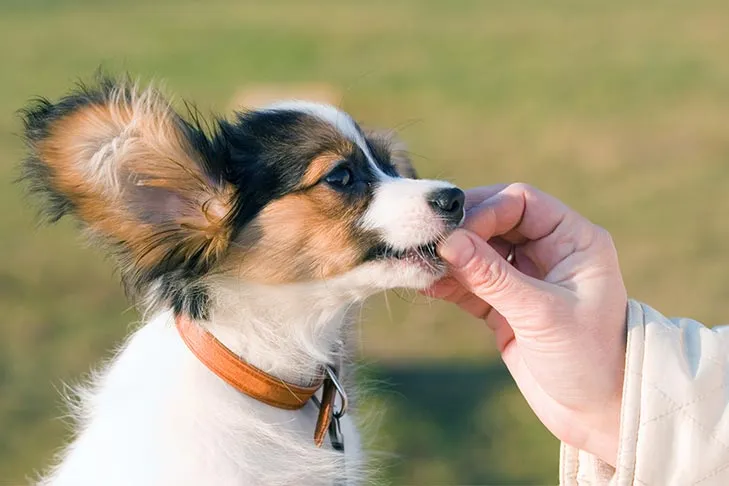Sharing food with our beloved canine companions is a common desire for many pet owners. After all, dogs are integral members of our families, and it’s natural to want to include them in our mealtimes. However, a dog’s digestive system and nutritional needs differ significantly from humans, making it crucial to understand which human foods are safe for them and which pose serious health risks. Feeding your dog the wrong item can lead to anything from an upset stomach to life-threatening conditions.
This comprehensive guide from Dog Care Story aims to enlighten pet owners about common human foods that dogs can eat, offering detailed insights into their benefits, safe preparation, and potential caveats. Understanding the dietary needs of your pet is crucial, whether you’re considering healthiest dry dog food options or exploring human food additions. Always remember that moderation is key, and any new food introduction should be done gradually to monitor your dog’s reaction.
Safe Human Foods for Your Canine Companion
Many everyday ingredients found in your kitchen can be safely shared with your dog, provided they are prepared correctly and given in appropriate quantities. These foods can offer various nutritional benefits and make for enjoyable treats.
Bread
Small amounts of plain bread are generally harmless for your dog, but it’s important to ensure it contains no spices, especially garlic or onion, and absolutely no raisins, which are highly toxic to dogs. While safe, bread offers minimal nutritional value and is high in carbohydrates and calories, similar to its effect on humans. Homemade bread might be a slightly better option than store-bought varieties, which often contain unnecessary preservatives, but it’s generally best to offer it sparingly or avoid it altogether.
Cashews
Cashews can be a delightful treat for dogs, but only in very small quantities. They contain beneficial nutrients such as calcium, magnesium, antioxidants, and protein. However, despite being lower in fat than some other nuts, overfeeding can contribute to weight gain. Always ensure cashews are unsalted, as excessive sodium is detrimental to canine health.
Cheese
Most dogs can safely enjoy small to moderate amounts of cheese. While rare, some dogs can be lactose intolerant, so introduce cheese slowly and observe for any digestive upset. Lower-fat varieties like cottage cheese or mozzarella are preferable to reduce the risk of excessive fat intake, which can lead to pancreatitis. Many dogs also enjoy specialized dog chews made from dried cheese, designed specifically for their consumption.
 All American Dog resting its head on a kitchen table, looking intently at a piece of cheese.
All American Dog resting its head on a kitchen table, looking intently at a piece of cheese.
Coconut
This versatile fruit offers more than just a tropical flavor. Coconut contains lauric acid, known for its antibacterial and antiviral properties, which can help support your dog’s immune system. It may also contribute to fresher breath and alleviate certain skin conditions like hot spots, flea allergies, and itchy skin. Both coconut milk and coconut oil are safe for dogs. However, always ensure to remove the furry outer shell, as it can be a choking hazard or cause intestinal blockage if ingested.
Corn
Corn is a surprisingly common ingredient in many commercial dog foods, serving as a source of carbohydrates, fiber, and protein. If you wish to share corn with your dog, it must be completely removed from the cob. Corn cobs are indigestible and can cause serious intestinal blockages, requiring emergency veterinary intervention. Opt for plain, cooked corn kernels as a safe snack.
Eggs
Fully cooked eggs are an excellent source of protein and can even help settle an upset stomach. They are packed with vitamins, minerals, and amino acids crucial for a dog’s health. It is vital to ensure eggs are cooked all the way through, as raw egg whites contain avidin, an enzyme that can interfere with biotin absorption, potentially leading to a biotin deficiency over time. Scrambled, boiled, or poached eggs without any added seasonings are ideal.
Fish
Certain types of fish, when properly prepared, can provide a significant health boost for your dog due to their rich content of good fats and amino acids. Salmon and sardines are particularly beneficial. Salmon is loaded with protein and Omega-3 fatty acids, promoting joint health, brain function, and a shiny coat. Sardines offer similar benefits and have soft, digestible bones that provide extra calcium. With the exception of sardines, all tiny bones must be meticulously removed from other fish types, as they can splinter and cause internal injury. Never feed your dog raw or undercooked fish, as it can contain parasites that are highly toxic and potentially fatal. Always cook fish thoroughly and allow it to cool before serving, limiting intake to no more than twice a week.
Ham
While a small piece of ham might not cause immediate harm, it’s certainly not the healthiest option for your dog. Ham is notoriously high in sodium and fat, which can lead to digestive upset, pancreatitis, and long-term health issues if fed regularly. Sharing a minuscule, unseasoned piece occasionally as a rare treat is acceptable, but it should not become a continuous habit or a significant part of their diet.
 French Bulldog attentively eating from a dog bowl placed on the floor at home.
French Bulldog attentively eating from a dog bowl placed on the floor at home.
Honey
Honey is more than just a sweet treat; it’s a natural powerhouse of nutrients, including vitamin A, potassium, calcium, magnesium, copper, and a wealth of antioxidants. In small amounts, honey can surprisingly assist dogs with seasonal allergies by introducing trace amounts of local pollen, which may help build immunity. Beyond consumption, the sticky consistency of honey makes it a natural antiseptic, useful as a topical treatment for minor burns and superficial cuts on your dog’s skin.
Milk
While the image of a dog lapping up milk is classic, caution is advised. Many dogs can be lactose intolerant, especially as they mature, leading to digestive issues like diarrhea or gas. While a small amount of milk may be fine for some, owners should be vigilant for any signs of intolerance. For hydration, fresh water is always the best and safest option. If you do offer milk, ensure it’s plain and full-fat, avoiding any sweetened or flavored varieties.
Peanut Butter
Peanut butter is a beloved dog treat and an excellent source of protein, heart-healthy fats, vitamins B and E, and niacin. The healthiest option is raw, unsalted peanut butter without any added sugars. However, when offering treats like peanut butter, it’s vital to remember that some human ingredients can be harmful. Always check labels carefully to ensure the peanut butter does not contain xylitol, a sugar substitute that is extremely toxic to dogs and can cause a rapid, life-threatening drop in blood sugar and liver failure, making it one of the key what dog food not to feed your dog considerations.
Peanuts
Unlike almonds, which are generally not recommended for dogs, plain peanuts are safe for dogs to eat. They are packed with beneficial fats and proteins that can contribute to your dog’s overall health. However, like cashews, peanuts are calorie-dense and high in fat, so moderation is crucial to prevent weight gain and potential pancreas issues. Always offer unsalted, roasted, or raw peanuts, avoiding any spiced or flavored varieties that could contain harmful ingredients.
Popcorn
Unsalted, unbuttered, air-popped popcorn can be a fun and safe snack for your dog in moderation. It contains riboflavin and thiamine, which support eye health and digestion, along with small amounts of iron and protein. Before giving popcorn to your dog, ensure all kernels are fully popped, as unpopped kernels can be a choking hazard or cause dental damage. Avoid microwave popcorn, which often contains artificial ingredients and high levels of salt.
Pork
Pork is a highly digestible protein source, rich in amino acids essential for muscle development and overall health. While it typically contains more calories per pound than other lean meats, it may be a good option for dogs with sensitivities to more common proteins like chicken or beef. When preparing pork for your dog, always ensure it is thoroughly cooked, plain, and free from excessive fat, skin, or bones. Remove all bones, as cooked bones can splinter and cause internal damage.
Quinoa
Quinoa, a complete protein, has become a popular ingredient in some high-quality dry dog foods. Its robust nutritional profile makes it a healthy and grain-free alternative to starches like corn, wheat, and soy, which are often used as fillers in kibble. Cooked quinoa can be added to your dog’s regular meal in small amounts to boost protein and fiber content.
 A Samoyed puppy lying comfortably in green grass outdoors.
A Samoyed puppy lying comfortably in green grass outdoors.
Salmon
As reiterated from the fish section, fully cooked salmon is an outstanding source of protein, beneficial fats, and amino acids. It actively promotes joint and brain health, contributes to a luxurious coat, and significantly boosts your dog’s immune system. However, the critical warning bears repeating: raw or undercooked salmon contains a parasite called Neorickettsia helminthoeca, which can cause salmon poisoning disease—a severe and often fatal illness in dogs. Symptoms include vomiting, diarrhea, dehydration, and lethargy. Cooking salmon thoroughly eliminates these parasites, making it safe for consumption.
Shrimp
A few shrimp offered occasionally can be a healthy treat for your dog. They are low in fat, calories, and carbohydrates, while being rich in antioxidants, vitamin B-12, and phosphorus. It is imperative that shrimp are fully cooked and that the entire shell, including the tail, head, and legs, is completely removed, as these parts can be sharp and indigestible, posing a choking risk or causing internal injury.
Tuna
Dogs can consume tuna, but only in very small, controlled amounts due to potential mercury content. In moderation, cooked, fresh tuna is an excellent source of omega-3 fatty acids, which are beneficial for heart and eye health. If opting for canned tuna, choose varieties packed in water (not oil) and ensure it contains no added spices or seasonings. The sodium content in canned tuna should also be considered, so it should only be an occasional treat rather than a regular dietary addition.
Turkey
Plain, cooked turkey is generally safe for dogs and is a lean source of protein. When preparing turkey for your dog, always remove any excess fat and skin, as these can be difficult to digest and contribute to pancreatitis. Crucially, check thoroughly for bones; poultry bones can splinter easily when chewed, leading to blockages or tears in the intestines, which are veterinary emergencies. Any meat prepared with excessive salt, seasonings, onions, or garlic should be strictly avoided. Understanding what dog food not to feed dogs extends to seasoned human foods.
Wheat or Grains
The debate around grain-free diets has been prevalent, but it’s perfectly fine for most dogs to consume grains. In fact, grains like wheat and corn are valuable sources of protein, essential fatty acids, and fiber, contributing to a balanced diet and healthy digestion. Unless your dog has a confirmed grain allergy, there’s no inherent need to avoid them. Always consult your veterinarian for personalized dietary recommendations, especially if your dog has specific allergies or health conditions.
Yogurt
Plain yogurt can be a perfectly acceptable and even beneficial snack for dogs. It contains active bacteria cultures (probiotics) that can help strengthen the digestive system and improve gut health. However, as with milk, some dogs may have difficulty digesting dairy products due to lactose intolerance. The best choice is plain, unsweetened yogurt without any artificial sweeteners, flavors, or added fruits, as some of these can be toxic or unhealthy for dogs.
 A small Papillon puppy gently taking a treat from a human hand.
A small Papillon puppy gently taking a treat from a human hand.
Important Considerations When Sharing Human Foods
While the list of Foods Dogs Can Eat is extensive, responsible pet ownership requires careful consideration beyond just safety. Always introduce any new human food slowly and in very small quantities to monitor for adverse reactions. Ensure that all foods are prepared plainly, without seasonings, spices, butter, or oils that are often used in human cooking but can be harmful to dogs. Portion control is vital; even healthy human foods can contribute to obesity if overfed, and treats should never exceed 10% of your dog’s daily caloric intake. For new puppy owners, deciding what to give a labrador puppy to eat involves careful consideration of their developing digestive system and nutritional requirements, making vet consultation even more important.
Foods Dogs Cannot Eat
Equally important as knowing what foods dogs can eat is having a clear understanding of what human foods are dangerous and absolutely off-limits. Some common household items like chocolate, onions, garlic, grapes, raisins, avocado, macadamia nuts, and anything containing xylitol (a sugar substitute) can cause severe illness, organ damage, or even death in dogs. Always keep these toxic foods out of your dog’s reach and be vigilant about potential ingestion. If you suspect your dog has eaten something toxic, contact your veterinarian or an animal poison control center immediately.
In conclusion, sharing certain human foods can be a delightful way to bond with your dog and supplement their diet with beneficial nutrients. However, knowledge and caution are paramount. Always prioritize your dog’s health by researching thoroughly, preparing foods correctly, and offering them in moderation. While exploring various foods for your dog, always prioritize their overall health. Discussing dietary changes with your veterinarian is key, especially when considering implications such as grain free dog food heart disease or other specific health concerns. By adhering to these guidelines, you can ensure your canine companion enjoys a safe and healthy culinary experience alongside you.
